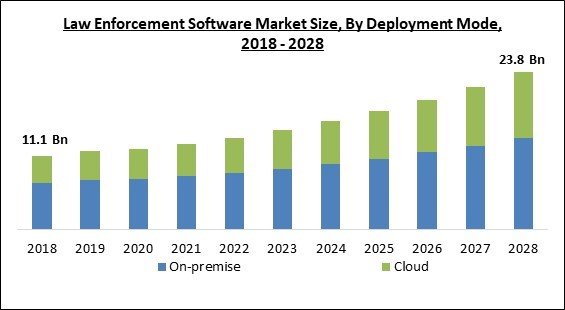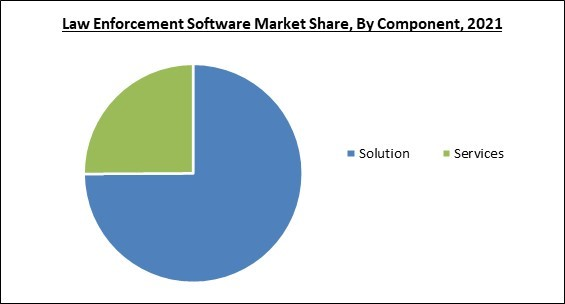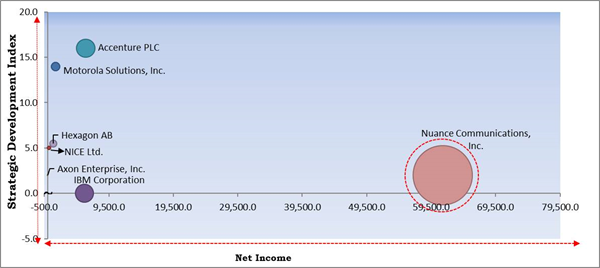The law enforcement software is a new security management service provider for public safety and law enforcement incidents. The program automates processes including casework, report writing, and data storage while also allowing officials to study critical information via reports and databases. Computer-aided design, wiretap system, video analysis, and other software are included in this software. It can be used in prison management systems to safely share data and save time. Report writing, law enforcement, casework, and police dispatching are a few of the operations that law enforcement software automates to aid cops and policymakers. Law enforcement agreements give law enforcement agencies the authority to manage critical data for analysis, such as crime databases and records. Law enforcement officials can access data at any time and from any location via these modern law enforcement solutions. For the typical person, technology has made life easier and more comfortable. As technology growth continues to accelerate, innovations pervade every aspect of society. It is critical that law enforcement organizations use technological goods to advance in the law enforcement process.
Law enforcement agencies all over the world are utilizing technological breakthroughs in order to empower police by keeping them well-informed and more efficient. Technology has helped policemen become more efficient, informed, and knowledgeable, allowing them to spend more time on patrol and interacting with the public. Police officers can spend lesser time at their desks preparing reports and recording data with the help of advanced reporting features of the law enforcement software. The electronic storage of information makes it much easier and faster to prepare and amend reports.
One of the primary factors driving the growth of the law enforcement software market in the coming years is the growing demand for powerful communication police enforcement. Additionally, effective communication is necessary to ensure the safety of law enforcement personnel and to increase their success rate.
COVID-19 Impact Analysis
The COVID-19 pandemic caused a severe impact on various economies all over the world. Several businesses were significantly devastated as a result of the outbreak of the COVID-19 infection. In addition, the governments of several countries were forced to impose lockdown in their nations. As a result, the manufacturing units of numerous goods were temporarily shut down. Moreover, these lockdowns also caused a major disruption in the supply chain of various goods. Further, the COVID-19 led the healthcare industry to a significant failure due to the shortage of beds and oxygen in hospitals.Market Growth Factors
Integration of advanced technologies in law enforcement software
Law enforcement agencies are increasingly using advanced software like predictive analytics, digital and mobile forensics, as well as crime analytics, owing to the world's rapid digital transformation and the expectation that police officers is expected to be able to work seamlessly between the office and the street. This opens up new possibilities for not only modernizing legacy systems like computer-assisted dispatch and record management, but also implementing new and advanced capabilities like forensic case management, predictive policing, body-worn cameras, digital & mobile forensics, crime analytics, and digital evidence management. To execute their daily operations, law enforcement agencies are depending more than ever on new technology such as financial investigations, cyber defense actions, big data & data analytics, and more.An increasing number of ransomware attacks
Cyberattacks are becoming more common. Doxing and ransomware are a few of the major threats to a department's security and productivity. Ransomware encrypts the victim's sensitive data and holds it hostage, refusing to unblock it unless the user pays a certain amount of money. A significant number of law enforcement departments and government agencies have been harmed by these attacks, with many of them losing years of data and perhaps compromising crucial cases. Several law enforcement agencies comprise outdated systems, which can become ideal targets for these cyber-attacks.Market Restraining Factors
Government compliances and regulations
Law enforcement authorities can use intelligence to solve crimes more effectively. Security, on the other hand, ensures that confidential data and information do not fall into the access of any unauthorized individual or organization. Surveillance by law enforcement agencies aids in gathering large amounts of information regarding a crime or criminal activity prior to its occurrence, which aids in the establishment of the number of crime occurrences. Because this software is used to manage personal information and assist law enforcement in the investigation, detection, or prosecution of criminal offenses, law enforcement software solution providers must comply with government codes and standards, and regulations to provide appropriate controls for protecting crucial information.Component Outlook
Based on Component, the market is segmented into Solution and Services. In 2021, the services segment garnered a significant revenue share of the law enforcement software market. The rising growth of the segment is owing to the increasing demand for professional and managed law enforcement services. These services significantly streamline the process of managing the software and offer precise operation management.Solution Type Outlook
Based on Solution Type, the market is segmented into Computer-aided dispatch, Incident Response & Case Management, Record Management, Jail Management, and Others. In the solution segment, the computer-aided dispatch recorded the largest revenue share of the market. To respond promptly during an incident, law enforcement officers require accurate and real-time information. Computer-aided dispatch solution allows officers to immediately respond to an emergency call. Dispatchers, call takers, and 911 operators use computer-aided dispatch systems to prioritize and record incident calls, determine the location and status of responders across the field, and efficiently dispatch responder personnel. CAD systems can send messages to emergency responders in the field using mobile data terminals, radios, and cell phones. A geographic information system, an automatic vehicle locating system, a caller identification system, logging recorders, and numerous databases may all be interfaced with CAD systems. A unified CAD system connects to several agencies and computer systems that support fire, law enforcement, and EMS, as well as providing communication across agencies and jurisdictions.Services Type Outlook
Based on Services Type, the market is segmented into Implementation, Consulting, and Training & Support. In the services segment, the training and support segment procured a substantial revenue share of the market in 2021. The increasing growth of the segment is attributed to the rising number of people joining law enforcement department. Support for the implementation and usage of law enforcement software is included in training and support services. They include assistance provided during, before, and after the deployment, as well as maintenance exercises. Functional, technical, remote, and database support are provided to law enforcement companies via phones, web conferencing, and ticketing systems, as well as onsite assistance.Deployment Mode Outlook
Based on Deployment Mode, the market is segmented into On-premise and Cloud. In 2021, the on-premise segment witnessed the maximum revenue share of the law enforcement market. The growth of the segment is attributed to the rising demand for control over the software. On-premises deployment involves installing solutions on hardware that is located across the premises of law enforcement agencies. Law enforcement employees have direct access to sensitive case files and can manually regulate the computing infrastructure's configuration, management, and security. Despite the fact that on-premises solutions are more expensive than cloud-based solutions, several law enforcement and public safety organizations prefer this deployment approach due to security concerns when dealing with highly sensitive data.Regional Outlook
Based on Regions, the market is segmented into North America, Europe, Asia Pacific, and Latin America, Middle East & Africa. In 2021, North America accounted for the largest revenue share of the law enforcement software market. The increasing growth of the regional market is due to the surging adoption of latest and advanced technologies across the region. This region has observed great political transformations, economic growth, and social shifts in recent years. Because of the complexity of cyber threats, countries like Canada, Mexico, and the United States have implemented new national cybersecurity regulations. As a developed economy, North America is seeing rapid changes in the adoption and deployment of new technologies that are supported by adequate infrastructure. Therefore, the growth of the regional market is being significantly augmented.Law Enforcement Software Market Competition Analysis
The major strategies followed by the market participants are Acquisitions. Based on the Analysis presented in the Cardinal matrix; Nuance Communications, Inc. is the major forerunner in the Law Enforcement Software Market. Companies such as Accenture PLC, Motorola Solutions, Inc. and NICE Ltd. are some of the key innovators in the Market.
The market research report covers the analysis of key stake holders of the market. Key companies profiled in the report include IBM Corporation, Accenture PLC, Motorola Solutions, Inc., NICE Ltd., DXC Technology Company, Esri, Inc., Hexagon AB, Nuance Communications, Inc., Axon Enterprise, Inc., and Palantir Technologies Inc.
Recent Strategies Deployed in Law Enforcement Software Market
Partnerships, Collaborations and Agreements:
- Mar-2022: Hexagon's Safety came into a partnership with VIDIZMO, an enterprise video content management system. This partnership aimed to offer enhanced video content and digital evidence management. This partnership is expected to allow Hexagon's customers to manage the all-over lifecycle of digital evidence.
- Jan-2022: NICE partnered with Magnet Forensics, a global leader in the development of software solutions. Through this partnership, the company aimed to bring digital transformation in police investigations and case building in order to expedite the pursuit of justice.
- Nov-2021: Skydio teamed up with Axon, a global leader in connected public safety technologies. Under this partnership, Skydio is expected to help Axon automatically upload videos and photos captured on their drones to Axon Evidence through early access program.
Product Launches and Product Expansions:
- Mar-2022: NICE rolled out X-Sight, an advanced Entity Risk SaaS solution. The new product is powered by machine learning, entity resolution, network analytics, and AI and is expected to provide a single-risk score that offers a financial institution meaningful insight into its customers across an enterprise by aiding them in preventing fraud and increasing the efficiency of anti-money laundering applications.
- Sep-2021: Motorola launched the M500, the first AI-enabled in-car video system for law enforcement. The new product comprises new backseat passenger analytics with the ability to record footage with an in-car camera whenever a person enters the back of a police vehicle.
»Acquisitions and Mergers:
- Nov-2021: Accenture completed its acquisition of ClearEdge Partners, a company specializing in procurement spend management. Through this acquisition, the company aimed to integrate ClearEdge's solutions, proprietary methodologies, and IT expertise into its SynOps platform in order to enable Accenture to extend purchasing expertise and insights to aid its customers in saving costs and extracting greater value out of prevailing IT investments.
- Aug-2021: Accenture Federal Services took over Novetta, an analytics software and solutions provider. With this acquisition, the company aimed to add National Security offerings into its portfolio in order to offer highly specialized, mission solutions that customers turn to for excellence in the converging domains of intelligence expertise, analytics, cloud engineering, and cyber.
- Jul-2021: Accenture acquired Openminded, a cybersecurity services company based in France. With this acquisition, the company aimed to avail Openminded's cloud & infrastructure security, advisory, managed security services, and cyber defense to its clients in order to aid them in estimating and lowering cybersecurity risks, quickly detecting and addressing cyber incidents, and deploying best practices within regulatory compliance.
- Jun-2021: Accenture took over umlaut, an engineering services and consulting company. Through this acquisition, the company aimed to expedite its deep engineering capabilities in order to aid organizations in the utilization of digital technologies such as artificial intelligence, cloud, and 5G with the purpose to transform their techniques for designing, engineering, and manufacturing their products and embed sustainability.
- Aug-2020: Motorola completed its acquisition of Callyo, a cloud-based mobile applications vendor for law enforcement. This acquisition aimed to complement the command center software suite critical mobile technology capabilities of Motorola, which offers a seamless flow of information from the field to the command center.
Scope of the Study
Market Segments Covered in the Report:
By Component
- Solution
- Computer-aided dispatch
- Incident Response & Case Management
- Record Management
- Jail Management
- Others
- Services
- Implementation
- Consulting
- Training & Support
- On-premise
- Cloud
By Geography
- North America
- US
- Canada
- Mexico
- Rest of North America
- Europe
- Germany
- UK
- France
- Russia
- Spain
- Italy
- Rest of Europe
- Asia Pacific
- China
- Japan
- India
- South Korea
- Australia
- Malaysia
- Rest of Asia Pacific
- LAMEA
- Brazil
- Argentina
- UAE
- Saudi Arabia
- South Africa
- Nigeria
- Rest of LAMEA
Key Market Players
List of Companies Profiled in the Report:
- IBM Corporation
- Accenture PLC
- Motorola Solutions, Inc.
- NICE Ltd.
- DXC Technology Company
- Esri, Inc.
- Hexagon AB
- Nuance Communications, Inc.
- Axon Enterprise, Inc.
- Palantir Technologies Inc.
Unique Offerings from the Publisher
- Exhaustive coverage
- The highest number of Market tables and figures
- Subscription-based model available
- Guaranteed best price
- Assured post sales research support with 10% customization free
Table of Contents
Companies Mentioned
- IBM Corporation
- Accenture PLC
- Motorola Solutions, Inc.
- NICE Ltd.
- DXC Technology Company
- Esri, Inc.
- Hexagon AB
- Nuance Communications, Inc.
- Axon Enterprise, Inc.
- Palantir Technologies Inc.











